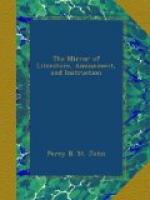From the Amulet we turn to Mr. Watts’s El Dorado of poetry and romance in superb crimson silken sheen and burnished gold edges. Rich as the exterior unquestionably is, it but accords with the rare treasures which it envelopes. We first indulged our early custom of “looking at the pictures,” but must, as sober middle-aged persons ought to do—begin at the beginning. Passing over the Advertisement, in which the editor makes some judicious observations on the remuneration of British artists, &c. the first tale is the Love-Draught, in the best style of the author of “Highways and Bye-ways,” with many fine touches of Irish humour and sentiment. We next notice a Village Romance, by Miss Mitford, with a host of pretty facts and feelings; and a Calabrian Tale, the Forest of Sant Eufemia, by the author of “Constantinople in 1829:” it is the longest, and perhaps the best story in the volume, and brings the author’s descriptive powers into full play in the stirring scenes of brigand life. Next is The Last of the Storm, a tale of deep and thrilling interest, by Mr. Banim. Of the same description is our prose extract—
THE CONFESSION.
By John Galt, Esq.
My furlough had nearly expired; and, as I, was to leave the village the next morning to join my regiment, then on the point of being shipped off at Portsmouth, for India, several of my old companions spent the evening with me, in the Marquess of Granby. They were joyous, hearty lads; but mirth bred thirst, and drinking begot contention.
I was myself the soberest of the squad, and did what I could to appease their quarrels. The liquor, however, had more power than my persuasion, and at last it so exasperated some foolish difference about a song, between Dick Winlaw and Jem Bradley, that they fell to fighting, and so the party broke up.
Bradley was a handsome, bold, fine fellow, and I had more than once urged him to enlist in our corps. Soon after quitting the house, he joined me in my way home, and I spoke to him again about enlisting, but his blood was still hot—he would abide no reason—he could only swear of the revenge he would inflict upon Winlaw. This led to some remonstrance on my part, for Bradley was to blame in the dispute; till, from less to more, we both grew fierce, and he struck me such a blow in the face, that my bayonet leaped into his heart.
My passion was in the same moment quenched. I saw him dead at my feet—I heard footsteps approaching—I fled towards my father’s house—the door was left unbolted for me—I crept softly, but in a flutter, to bed—but I could not sleep. I was stunned;—a fearful consternation was upon me;—a hurry was in my brain—my mind was fire. I could not believe that I had killed Bradley. I thought it was the nightmare which had so poisoned my sleep. My tongue became as parched as charcoal: had I been choking with ashes, my throat could not have been filled with more horrible thirst. I breathed as if I were suffocating with the dry dust into which the dead are changed.




